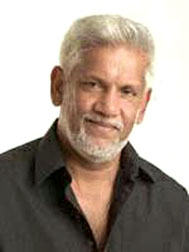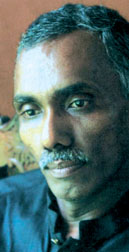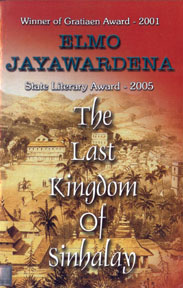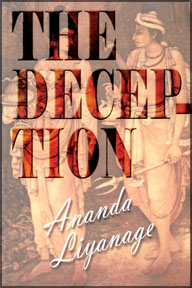Random Musings
The meet-up of the two writer - historians
Sachitra Mahendra
Ananda Liyanage launched his second book The Deception on interesting
Friday, last week. It was the smallest book launch I have ever been in.
Apart from Sinhala and English comperes, there was only one keynote
speaker; that was Captain Elmo Jayawardena.
So my focus is fixed on Ananda Liyanage and Captain Elmo Jayawardena
this week.
They are both novelists trekking down history. Yet, their professions
are poles apart from being either writers or historians; Ananda is a
financier immersed in lectures on the subject and Elmo is a captain
awestruck on blue skies and charity. Both do writing parallel to the
respective post-retirement professional schedules.
Elmo has touched the modern history of British invasion, and Ananda’s
passion is ancient history.
 |
 |
|
Captain
Elmo Jayawardena |
Ananda
Liyanage |
 |
 |
Elmo Jayawardena’s The Last Kingdom of Sinhalay, though runs over 850
taller-than-average pages, grips you sharp towards the end. In fact it’s
what happened to me, though it took months to complete the reading.
Ananda Liyanage’s first book is The Legacy based on the search for the
King Dutugemunu’s sceptre.
Its closing pages are so engrossing, and I am yet to discover the
feel of The Deception. Note, all three books start with ‘the’. One more
interesting feature about Liyanage’s novel: the first work contains 458
pages, the second one, 455 pages.
I read captain’s book in 2005 and Ananda’s book the following year. I
could not help and was so fascinated comparing The Last Kingdom of
Sinhalay with The Legacy.
Jayawardena’s book contains raw data on history in italics, while his
interpretative plot twisting without harming the written history is
simply smooth. Liyanage’s plot has the Dan Brown touch, though he claims
to have never read the famous Da Vinci Code author.
Dan Brown’s all four books have the same plot block. Half reading of
The Deception seems to suggest Liyanage’s possible metamorphosis into
local version of Dan Brown. Reading half makes the judgment wrong, so I
do not comment on it yet.
I was virtually comparing both writers, but I never divined I could
locate the duo in one place after two years.
And when I located them together, the surprise was on me to discover
it was their first face-to-face encounter (though they had been
maintaining communication over the phone earlier).
Whoever says art is more philosophical than history, it has now
become a cliché, but that whoever is right. And the same experts say art
can contain fallacies of history.
Now this is what stirred up a hornet’s nest when they started arguing
about the historical accuracy of Jackson Anthony’s Aba recently.
Nobody has seen the actual happenings of history. So who cares for
fallacies, as long as you are captivated by the creativity? Well, I am
referring to trivialities, not the gross mistakes and
misinterpretations.
Elmo Jayawardena’s book has achieved what it really deserves: the
State Literary Award and Gratiaen prize in 2005 and I feel Liyanage
deserves the same reputation. His book should be at least shortlisted,
if only there was one such item at either State Literary Award or
Gratiaen festival.
Now here’s a bit of a quote chapter and verse from Jayawardena and
Liyanage for you to get a bit of an idea about the writing styles.
Unfamiliar names, unfamiliar places.
There is one line recorded in Grand Port in the year 1864.
It speaks of a death of someone called ‘Ihagama’.
Just one faded line, written not in remembrance, but for the record,
of a long forgotten prisoner who at one time had been a freedom fighter
in some far-away land.
(The Last Kingdom of Sinhalay)
Late in the night after Anula had left for Kirinda, a streak of light
rose from the vicinity of the depository to the night sky. Few people
saw it and even they did not attempt to understand it.
These strange occurrences now and then in the vicinity of the
depository were attributed to matters beyond human understanding falling
within the realm of the spiritual. The Legacy
[email protected] |

